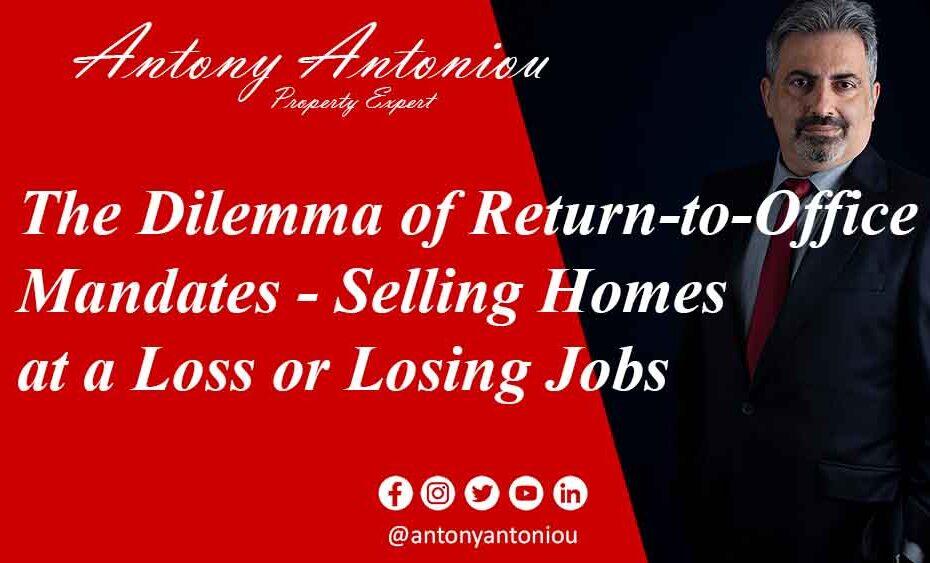The Dilemma of Return-to-Office Mandates – Selling Homes at a Loss or Losing Jobs
In a rapidly changing post-pandemic world, return-to-office mandates are causing a significant dilemma for many Americans: sell their homes at a loss or risk losing their jobs. As companies increasingly call employees back to the workplace, homeowners are faced with tough decisions that could have a lasting impact on their finances and lifestyles. In this blog post, we explore the implications of this challenging situation and the factors at play.
The Relocation Trend
According to a survey conducted by real estate company Redfin, a rising number of return-to-work policies are motivating one in ten homeowners to consider relocating. For some, the prospect of returning to the office is incompatible with their current living situation, forcing them to make tough choices.
Real estate agent Shauna Pendleton shared a story of two clients in Boise, Idaho, who find themselves in this predicament. Their Seattle-based employer has mandated a return to the office three days a week or risk job loss, giving them a mere six months to make the transition. The challenge lies in the fact that they purchased their home when property prices were at their peak. Consequently, they are likely to sell it at a significant loss.
Pendleton lamented, “They’ll probably have to take a $100,000 loss on their home. Their new house in Seattle won’t be anything close to the size of their property in Boise, and their mortgage rate will be much higher.”
Rising Mortgage Rates
One complicating factor in this scenario is the current state of mortgage rates. The latest data from government-backed lender Freddie Mac reveals that a 30-year fixed-rate mortgage is now hovering at 7.18 percent, a considerable increase from just a year ago when it averaged 6.02 percent. With mortgage rates reaching levels not seen in over two decades, the prospect of selling one’s home becomes even less appealing.
As a result of these high mortgage rates, few homeowners are eager to sell their homes unless compelled by circumstances. Freddie Mac’s recent survey found that a staggering 82 percent of property shoppers feel “locked into” their current homes, with one in seven homeowners choosing to stay put primarily because they are locked into a lower mortgage rate.
Affordability Challenges
Further exacerbating the situation is the falling affordability of housing. Figures from the Atlanta Federal Reserve indicate that housing affordability has dipped below levels observed during the housing bubble peak in the lead-up to the 2008 financial crisis. This combination of rising mortgage rates and decreasing affordability makes it increasingly difficult for homeowners to navigate the current real estate landscape.
The Corporate Push for Office Returns
This dilemma unfolds against the backdrop of an increasing number of companies insisting that employees return to the office. Major corporations like JP Morgan Chase & Co and Davis Polk & Wardwell LLP are implementing policies that require employees to spend a significant portion of their workweek in the office. Zoom, the iconic video conferencing giant, has also joined the ranks by mandating in-office time for employees living within a 50-mile radius of a Zoom office.
Zoom CEO Eric Yuan expressed the importance of in-person interactions, highlighting that “we cannot debate each other well” in remote meetings, where everyone tends to be overly polite and friendly. This sentiment underscores the broader shift happening across industries as companies strive to recapture the benefits of in-person collaboration.
In Conclusion
As return-to-office mandates continue to gain traction, homeowners across the United States are grappling with a difficult choice: sacrifice their financial stability by selling their homes at a loss or risk job loss by refusing to return to the office. High mortgage rates and reduced housing affordability only compound the challenges faced by those caught in this predicament.
The coming months will undoubtedly shed more light on the long-term impact of these return-to-office policies on both the real estate market and the future of work. In the meantime, homeowners are left to make difficult decisions, weighing their financial well-being against the demands of their employers in an ever-evolving professional landscape.

